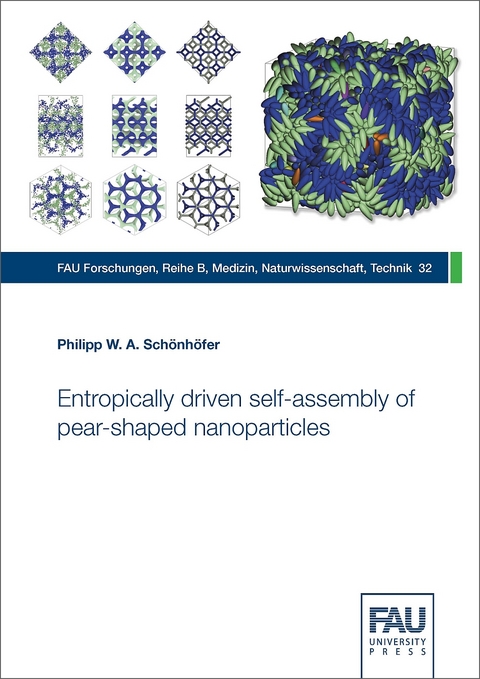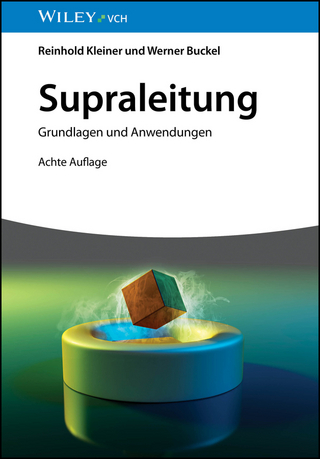
Entropically driven self‐assembly of pear‐shaped nanoparticles
Seiten
2020
Fau University Press (Verlag)
978-3-96147-268-0 (ISBN)
Fau University Press (Verlag)
978-3-96147-268-0 (ISBN)
The ambition to recreate highly complex and functional nanostructures found in living organisms marks one of the pillars of today‘s research in bio- and soft matter physics. Here, self-assembly has evolved into a prominent strategy in nanostructure formation and has proven to be a useful tool for many complex structures. However, it is still a challenge to design and realise particle properties such that they self-organise into a desired target configuration. One of the key design parameters is the shape of the constituent particles.
This thesis focuses in particular on the shape sensitivity of liquid crystal phases by addressing the entropically driven colloidal self-assembly of tapered ellipsoids, reminiscent of „pear-shaped“ particles. Therefore, we analyse the formation of the gyroid and of the accompanying bilayer architecture, reported earlier in the so-called pear hard Gaussian overlap (PHGO) approximation, by applying various geometrical tools like Set-Voronoi tessellation and clustering algorithms. Using computational simulations, we also indicate a method to stabilise other bicontinuous structures like the diamond phase. Moreover, we investigate both computationally and theoretically(density functional theory) the influence of minor variations in shape on different pearshaped particle systems, including the stability of the PHGO gyroid phase. We show that the formation of the gyroid is due to small non-additive properties of the PHGO potential. This phase does not form in pears with a „true“ hard pear-shaped potential.
Overall our results allow for a better general understanding of necessity and sufficiency of particle shape in regards to colloidal self-assembly processes. Furthermore, the pear-shaped particle system sheds light on a unique collective mechanism to generate bicontinuous phases. It suggests a new alternative pathway which might help us to solve still unknown characteristics and properties of naturally occurring gyroid-like nano- and microstructures.
This thesis focuses in particular on the shape sensitivity of liquid crystal phases by addressing the entropically driven colloidal self-assembly of tapered ellipsoids, reminiscent of „pear-shaped“ particles. Therefore, we analyse the formation of the gyroid and of the accompanying bilayer architecture, reported earlier in the so-called pear hard Gaussian overlap (PHGO) approximation, by applying various geometrical tools like Set-Voronoi tessellation and clustering algorithms. Using computational simulations, we also indicate a method to stabilise other bicontinuous structures like the diamond phase. Moreover, we investigate both computationally and theoretically(density functional theory) the influence of minor variations in shape on different pearshaped particle systems, including the stability of the PHGO gyroid phase. We show that the formation of the gyroid is due to small non-additive properties of the PHGO potential. This phase does not form in pears with a „true“ hard pear-shaped potential.
Overall our results allow for a better general understanding of necessity and sufficiency of particle shape in regards to colloidal self-assembly processes. Furthermore, the pear-shaped particle system sheds light on a unique collective mechanism to generate bicontinuous phases. It suggests a new alternative pathway which might help us to solve still unknown characteristics and properties of naturally occurring gyroid-like nano- and microstructures.
| Erscheinungsdatum | 17.02.2020 |
|---|---|
| Reihe/Serie | FAU Forschungen : Reihe B ; 32 |
| Verlagsort | Erlangen |
| Sprache | englisch |
| Maße | 170 x 240 mm |
| Gewicht | 747 g |
| Themenwelt | Naturwissenschaften ► Physik / Astronomie ► Atom- / Kern- / Molekularphysik |
| Schlagworte | Dichtefunktionaltheorie • Entropie • Flüssigkristall • Kolloid • Minimalfläche • Molekulardynamik • Monte-Carlo Simulation • Selbstorganisation • Weiche Materie |
| ISBN-10 | 3-96147-268-8 / 3961472688 |
| ISBN-13 | 978-3-96147-268-0 / 9783961472680 |
| Zustand | Neuware |
| Haben Sie eine Frage zum Produkt? |
Mehr entdecken
aus dem Bereich
aus dem Bereich
Buch | Softcover (2024)
Wiley-VCH (Verlag)
CHF 83,85


